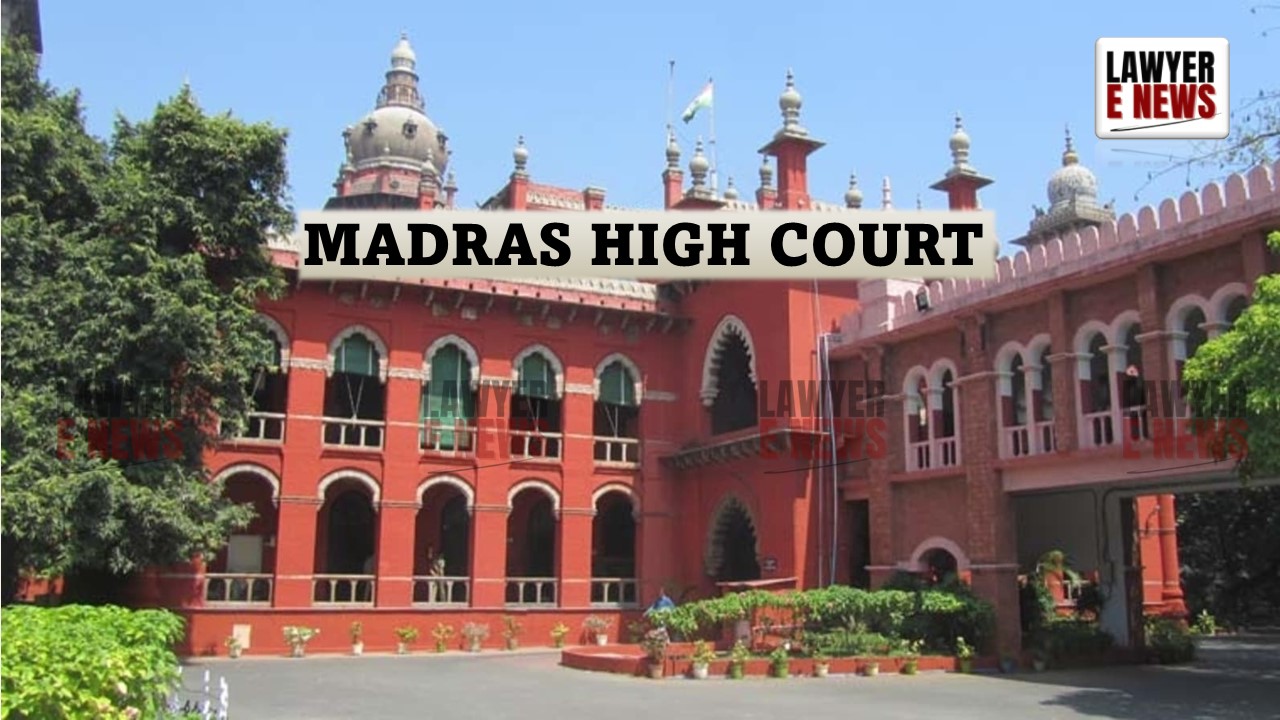-
by Admin
19 February 2026 3:14 PM



Madras High Court quashed an FIR registered under the Prevention of Corruption Act, 1988, and related provisions of the IPC against K. Shiva Kumar, a former Commissioner of Pallavaram Municipality. Justice N. Seshasayee held that the "approval process under Section 17-A of the Prevention of Corruption Act must be substantive, not ritualistic," highlighting that the provision was designed to safeguard public servants from vexatious prosecution for decisions taken in the course of their official duties.
The Court emphasized the role of Section 17-A as both a procedural and substantive protection, observing that the approval granted for the FIR was devoid of proper application of mind. The case underscores the need for public servants to be shielded from frivolous proceedings, particularly when the allegations stem from malicious intent.
"The Prosecution Has Been Fishing for Evidence for Seven Years: FIR Quashed for Lack of Prima Facie Case"
The case stemmed from a complaint filed in 2017 by one Anbalagan, who accused the petitioner, K. Shiva Kumar, of financial misconduct in awarding contracts during his tenure as Commissioner of Pallavaram Municipality. Three allegations were made against him:
Awarding a contract for cleaning school toilets to M/s Deepthi Enterprises (A3) without adhering to tender rules, allegedly resulting in financial loss during summer vacations when schools were closed.
Engaging Relyan Facility Services Pvt. Ltd. (A4) for a mosquito eradication program without proper tender procedures.
Procuring Fenthion medicine for treating elephantiasis from Pyrethrum India Pvt. Ltd. (A5) without adequate stock records, allegedly causing financial irregularities.
The Directorate of Vigilance and Anti-Corruption (DVAC) registered FIR No. 2 of 2023 against Shiva Kumar and others under Sections 120-B, 406, and 409 of the IPC and Sections 13(1)(c) and 13(2) of the Prevention of Corruption Act, after obtaining approval under Section 17-A of the Act.
"Approval Under Section 17-A is Not a Mere Formality—It Requires Genuine Application of Mind"
The Court held that the approval granted under Section 17-A was "mechanical" and "lacked substantive application of mind," which rendered the proceedings fundamentally flawed. Justice Seshasayee observed:
“Section 17-A is not an ornamental embellishment of zero value, but has been introduced in the statute with considerable purpose. It aims to save honest public servants who make bonafide decisions from being victimized.”
The judgment clarified that an authority granting approval under Section 17-A must evaluate not just the complaint but also other relevant materials, applying its expertise and understanding of the administrative context.
"Seven Years of Investigation But No Evidence: Allegations Wobble, Materials Are Unstable"
The Court noted that even after seven years of investigation, the DVAC was unable to substantiate the allegations against the petitioner:
On the first allegation regarding payments to M/s Deepthi Enterprises, the Court observed:
“The entire foundation of the prosecution is built on conjecture, with no evidence to show that the petitioner caused financial loss to the municipality.”
The Court further pointed out that the alleged payments were approved during flood relief efforts in December 2015, a situation that required emergency administrative decisions.
Regarding the second and third allegations concerning mosquito eradication and medicine procurement, the Court remarked:
“The prosecution itself admits that it does not have the documents required to verify the allegations, even after seven years of investigation. The process has been reduced to a fishing expedition.”
The Court held that the absence of incriminating material at this stage underscored the frivolous and vexatious nature of the proceedings.
"A Blackmailer as Complainant: Malafides in the Entire Proceeding"
The Court found that the complainant, Anbalagan, had a history of blackmailing public servants. Evidence was placed on record showing that he had been prosecuted for extortion in multiple cases. Justice Seshasayee observed:
“The materials placed before this Court point to a targeted and malicious attempt to implicate the petitioner in frivolous proceedings. This Court cannot permit such abuse of the legal process.”
The Court relied on the guidelines laid down in State of Haryana v. Bhajan Lal (1992), which allow for quashing of FIRs that are manifestly attended by malafides or initiated with ulterior motives.
"Section 17-A Compliance Cannot Be Reduced to a Ritual": Legislative Intent Upheld
Referring to the legislative history of Section 17-A, the Court noted its origins in the Supreme Court’s judgment in Subramanian Swamy v. Union of India (2014), which struck down Section 6-A of the Delhi Special Police Establishment Act for shielding corrupt officials. Section 17-A was introduced to strike a balance, providing a filter to protect honest public servants while ensuring accountability.
The Court stated: “The procedure for granting approval under Section 17-A is not an empty ritual. It is a substantive safeguard against the misuse of the Prevention of Corruption Act, and failure to comply with it in letter and spirit vitiates the entire proceeding.”
"Flawed Approval, Frivolous Allegations, and No Evidence: FIR Quashed"
In quashing the FIR, the Court summed up its findings:
The approval process under Section 17-A was conducted without substantive application of mind.
The allegations lacked evidentiary support, even after prolonged investigation.
The complaint was driven by malafides, with the complainant, a known blackmailer, abusing the process of law.
The Court concluded: “The allegation in the FIR is wobbling, the quality of material placed before the Court by the prosecution is unstable, and the quality of approval under Section 17-A is upsetting. This Court cannot allow such proceedings to continue.”
Date of Decision: January 6, 2025
